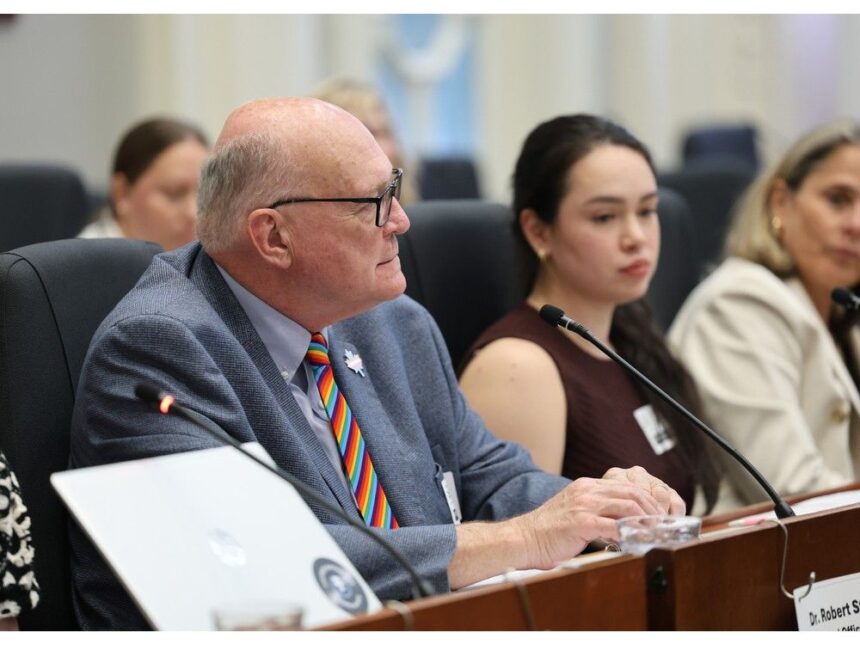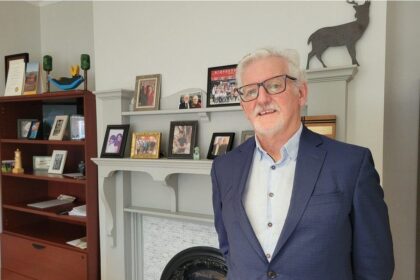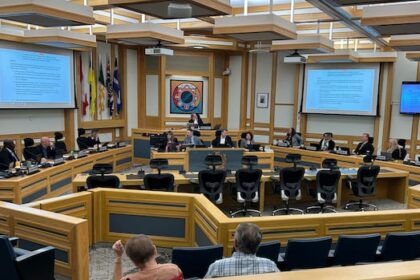Published Jun 10, 2025 • Last updated 5 hours ago • 6 minute readDr. Robert Strang, chief medical officer of health in Nova Scotia, and Natasha Hines, chairwoman of the Wellness Within board, are seen in the legislative chamber at Province House in Halifax on Tuesday June 10, 2025, at a health committee meeting on contraception and sexual health services. Photo by Tim Krochak /The Chronicle HeraldFree universal contraceptive care is the best medicine for Nova Scotia.That message was reiterated often and vehemently by a panel of 11 health-care professional and expert witnesses during a legislative health committee meeting Tuesday afternoon.“I want to urge everyone to consider how we can possibly not provide this service on a go-forward basis with full coverage for contraceptive care and PrEP across this province,” said Jennifer Benoit, provincial co-ordinator for the Nova Scotia Health Coalition, an amalgam of local health committees, community groups, organized labour, faith groups, women’s organizations, students, and individuals.THIS CONTENT IS RESERVED FOR SUBSCRIBERS ONLY.Subscribe now to access this story and more:Unlimited access to the website and appExclusive access to premium content, newsletters and podcastsFull access to the e-Edition app, an electronic replica of the print edition that you can share, download and comment onEnjoy insights and behind-the-scenes analysis from our award-winning journalistsSupport local journalists and the next generation of journalistsSUBSCRIBE TO UNLOCK MORE ARTICLES.Subscribe or sign in to your account to continue your reading experience.Unlimited access to the website and appExclusive access to premium content, newsletters and podcastsFull access to the e-Edition app, an electronic replica of the print edition that you can share, download and comment onEnjoy insights and behind-the-scenes analysis from our award-winning journalistsSupport local journalists and the next generation of journalistsRegister to unlock more articles.Create an account or sign in to continue your reading experience.Access additional stories every monthShare your thoughts and join the conversation in our commenting communityGet email updates from your favourite authorsSign In or Create an AccountorArticle contentDr. Leisha Hawker, past president of Doctors Nova Scotia, said experts overwhelmingly agree that “universal contraception is what this province needs.”“It’s the best medicine, it would improve gender and health equity, it’s smart public policy and it’s a smart investment,” said Hawker, a physician at the North End Community Health Centre in Halifax.The topic of discussion at the meeting was barrier-free access to contraception and sexual health services, including PrEP, for Nova Scotians. PrEP is a medication that can prevent HIV, a pill or an injection taken by people who are HIV-negative but at risk of acquiring HIV through sexual contact or injection drug use.NDP align with panelThe agenda aligns with the opposition New Democrats push for the Houston government to sign a bilateral pharmacare deal with the federal government to take advantage of federal funds that would initially make contraceptive and diabetes medications free at Nova Scotia pharmacies without the benefit of private insurance plans.Article contentSuch deals have already been reached with British Columbia, Manitoba, Prince Edward Island and Yukon.Lisa Lachance, the NDP member for Halifax Citadel-Sable Island, said a freedom of information request resulted in an estimated $8.5 million annual cost of delivering free access to birth control in Nova Scotia.Lachance asked Dr. Robert Strang, the province’s chief medical officer of health, if he thought that cost would be offset by other public health savings.“We’d have to look into that and do the health economics around that,” Strang replied.Kari Ellen Graham, longtime pharmacist and founder and co-chair of Access Now Nova Scotia, a group pursuing barrier free access to contraception in the province, offered numbers from a 2010 study by Options for Sexual Health that estimated every dollar spent on contraceptive support could save as much as $90 in public expenditure on social supports. Article contentGraham said British Columbia, which first provided contraceptives free of charge to its residents before signing on with the federal pharmacare program, relied on University of British Columbia research which projected that providing free prescription contraception would save the provincial health system there approximately $27 million annually, or over $5 per resident per year.Graham said removing contraceptive cost barriers leads to better health outcomes, a universal policy is more efficient than Nova Scotia’s current patchwork system, 85 per cent of Atlantic Canadians support it and that contraception is a gender equity issue that protects against reproductive coercion.“Years ago, a young mother regularly visited our pharmacy with her baby,” Graham said. “Her partner was abusive and pressuring her to have another child. I spoke to her about contraception, but she shook her head — she couldn’t afford it.Article content Dr. Leisha Hawker, past president of Doctors Nova Scotia. Photo by Ryan Taplin /The Chronicle Herald“Months later, she came in pregnant again, tearing up behind a forced smile. Her story isn’t unique — but it’s one I’ve never forgotten. I couldn’t advocate for her then. But you can now.”Access not a teen problemAbbey Ferguson is executive director of the Halifax Sexual Health Centre, which currently provides $17,800 worth of free prescription birth control to patients every year, sells an additional volume of $3,000 to $7,000 worth of birth control products for below pharmacy prices and provides $3,000 worth of free medications used to treat common infections.“There is a strong narrative that we are primarily offering free contraceptives to teenagers unwilling to tell their caregivers about their sexual activity,” Ferguson said. “In reality, we are offering these products to people from all walks of life – those working full time jobs without private insurance plans, patients on pharmacare who make ‘too much’ for a reasonable co-pay/deductible with their other expenses, newcomers, trans folks looking to prevent menstruation, patients seeking treatment for a host of reproductive disorders, and more.”Article contentFerguson said PrEP management is also a service provided by the centre.“We are no strangers to counselling patients who would like to be using it, except that they cannot afford the costs associated,” she said of an approximate $3,000 per patient, per year expense.“I implore you to listen to the diverse voices in this room and to implement no-cost, universal access to necessary sexual health medications,” Ferguson said.‘A huge gap’ in universal pharmacareMelissa Brooks, an obstetrician gynecologist at the IWK health center, an abortion provider, and co-medical director of the Reproductive Options and Services Clinic, said she had one key message for the committee.“Enacting cost-free access to contraception is the most effective action the government could take to significantly advance the reproductive health for Nova Scotians,” Brooks said. “In Nova Scotia, as in many provinces around the country, the lack of access to universal pharmacare creates a huge gap in access to contraception, especially long-acting reversible contraception, such as IUDs and subdermal contraceptive implants, which are the most reliable and cost-effective options, but can cost upwards of $400.”Article contentNatasha Hines, board chair of Wellness Within, a non-profit volunteer-based organization advocating for reproductive justice and health equity, said cost is a significant barrier to people accessing prescription birth control, a cost that falls disproportionately on women and persons of all genders at risk of unintended pregnancy. She said as many as 20 per cent of Nova Scotians have inadequate or no prescription drug coverage.”A registered nurse working in abortion care, Hines has encountered many patients who have been unable to afford their birth control and have consequently experienced unplanned pregnancies. “People are having to choose between putting food on the table, paying their bills, and paying for their prescriptions,” she said. “The current patchwork insurance system is inadequate at addressing these needs.”Article contentShe said an estimated 27 to 40 per cent of pregnancies in Canada are unintended and the direct cost of unplanned pregnancies in the country is $320 million per year.“It is essential that patients can access this important health care for free,” Hines said.Strang said contraception and sexual health services are an important part of health care that impacts all Nova Scotians.“We know there is a desire for government to do more, to provide universal access to contraception,” he said.“As the Minister of Health and Wellness has mentioned, she wants the best deal for Nova Scotians when it comes to barrier-free access to contraception.“So do we.”Susan Corkum-Greek, the Progressive Conservative MLA for Lunenburg, said a bilateral child-care agreement signed by the previous provincial Liberal government with Ottawa was short-sighted in that it excluded private operators in a province where private child care is important.Article content“Our government has been working steadily since that time to address that gap and yet we face a federal government that to this point has been rather inflexible,” Corkum-Greek said.“This is another situation where the federal government has put forward the offering of funding and we are very interested, we don’t want to leave money on the table but it does highlight that the devil truly is in the details.”Corkum-Greek asked if there was value in not rushing a pharmacare deal.“The minister is looking to get the best deal for Nova Scotians,” said Stacy Burgess, executive director of clinical care and delivery with the health department. “We are interested in going back to the table, we’re waiting for that invite, and to really look at ensuring that what we sign or do is both financially responsible for Nova Scotia, that it doesn’t change any of our current programs that we have in place and that we have long-term funding for it.”Article content
Free contraceptive care essential for Nova Scotians, committee told











